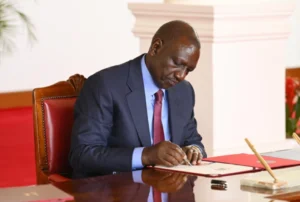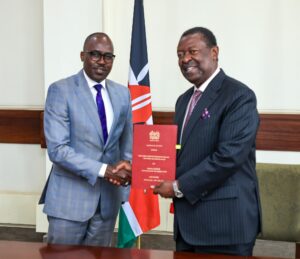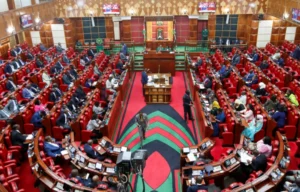KNEC Unveils Smart Digital Locks to Enhance Exam Security and Transparency
Education Cabinet Secretary Julius Ogamba unveiled that the new system is on trial in 250 special examination storage containers nationwide.

The papers will contain a candidate's name and a randomly assigned number. Candidates will be required to write their answers in the question booklets themselves.Photo/courtesy.
By Ruth Sang
Kenya National Examination Council (KNEC) has unveiled new security technology that will improve the integrity of national examinations through the use of smart digital padlocks. The advanced locks are being used for the first time in the 2025 national exams to safeguard examination materials across the country.
Education Cabinet Secretary Julius Ogamba unveiled that the new system is on trial in 250 special examination storage containers nationwide. It is included in the government’s larger plan to modernize the management and monitoring of exam material and prevent potential cases of malpractice.
According to the Ministry of Education, the electronic padlocks are bolted onto the main command centre of KNEC. With this link, real-time monitoring of every examination container is facilitated, including the precise time they are opened and closed. “The digital locks are synchronized with the KNEC command centre, which ensures continuous monitoring of each operation using the containers,” CS Ogamba said. He continued that the system would significantly improve accountability and transparency in exam distribution and collection.
In line with these enhanced provisions, all the individuals who are present in examination centers will have to hand over their mobile phones after the exam papers are distributed. This provision will be aimed at minimizing any form of communication that will disqualify the examination from its credibility.
CS Ogamba went on to clarify that security for the Kenya Certificate of Secondary Education (KCSE) will continue to be carried out by the National Police Service, while local education officers and school managers will be responsible for security matters for the Kenya Primary School Education Assessment (KPSEA) and Kenya Junior School Education Assessment (KJSEA) through a school-based mechanism.
Also, the council has introduced separate examination papers to provide fairness and accountability. The papers will contain a candidate’s name and a randomly assigned number. Candidates will be required to write their answers in the question booklets themselves. Post examinations, the identification part will be detached and sent separately to ensure impartiality in marking.
To achieve further coordination, the Ministry of Education implemented new collection times for the exam papers. KPSEA and KJSEA examination papers will be collected once a day at 6:00 a.m., while KCSE papers will be collected twice at 7:00 a.m. for morning papers and at noon for afternoon papers.
The 2025 national examinations are a key milestone, the inaugural national examination for Grade 9 students under the Competency-Based Curriculum. Grade Six students will be sitting the KPSEA from October 27 to 29, and Grade Nine students will be sitting the KJSEA from October 27 to November 3, in twelve areas of learning over six days.








